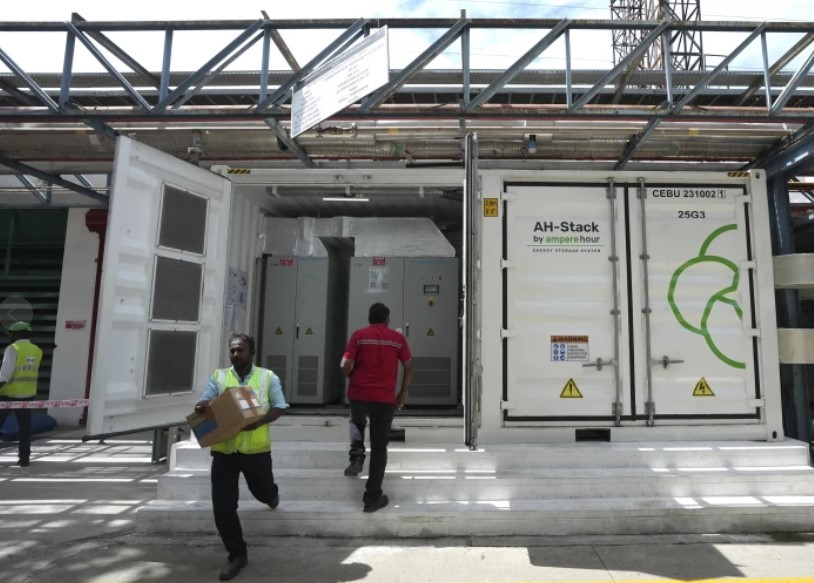
India's Growing Need for Energy Storage Amid Renewable Energy Expansion
In the southern Indian city of Chennai, a Coca-Cola factory is powered by a giant battery that runs machinery around the clock, replacing a diesel generator. This site is among the few in India utilizing electricity stored in batteries, a crucial element for advancing the country's shift from fossil fuels to renewable energy sources.
India's lithium-ion battery storage industry, capable of storing energy generated by wind turbines or solar panels, currently represents just 0.1% of global battery storage systems. However, the sector is rapidly expanding, with about a third of India's total battery infrastructure becoming operational this year alone.
"Our orders are growing exponentially," said Ayush Misra, CEO of Amperehour Energy, the company behind the battery installation at the Chennai factory. "It's a really exciting time to be a battery storage provider."
India's current battery storage capacity stands at around 100 megawatts, supplemented by 3.3 gigawatts from hydropower. The Indian government projects a need for approximately 74 gigawatts of energy storage from batteries, hydropower, and nuclear energy by 2032. However, experts argue the country may require nearly double that amount to meet its energy demands.
While some customers remain hesitant about adopting battery technology due to perceived costs and reliance on coal, the industry is gaining traction. The supply chain for batteries, largely concentrated in China, also presents geopolitical risks. Despite these challenges, significant investments from major Indian businesses indicate growing confidence in the sector.
In January, Reliance Industries announced plans to build a 5,000-acre factory in Jamnagar, Gujarat. Additionally, in March, Goodenough Energy committed $53 million to establish a 20 million kilowatt-hour battery factory in Jammu and Kashmir by 2027.
Alexander Hogeveen Rutter, an independent energy analyst based in Bengaluru, emphasized the need to increase storage capacity alongside renewable energy expansion. "Clean energy combined with adequate storage can be an alternative to coal. Not in the future but right now," he said. He debunked the myth that clean energy is more expensive than coal, noting that current prices for renewable energy combined with storage are cheaper than new coal.
Global battery costs are declining faster than anticipated, making energy storage systems increasingly competitive with both coal and other clean energy sources like hydropower and nuclear energy. Rutter highlighted that battery storage is already the largest resource for meeting California's evening peak electricity demands, surpassing gas, nuclear, and coal. He suggested that similar success could be achieved in India.
India faces unique challenges with its rapidly growing energy needs. The country's population is increasing, and extreme heat driven by climate change is leading to higher energy consumption, particularly for air conditioning. The International Energy Agency reported a 7% increase in India's electricity demand last year, with an expected annual growth of at least 6% over the next three years.
"The country needs to quadruple its renewable energy deployment just to meet demand growth," said Rutter.
Ankit Mittal, co-founder of Sheru, a software company providing energy storage and management solutions, advocated for making battery storage sites more flexible to accelerate industry growth. He suggested integrating battery storage sites with the national energy grid to supply electricity to regions most in need, rather than limiting them to local sites.
To further stimulate the battery sector, the Indian government announced a $452 million scheme last year to support an additional four gigawatts of battery storage by 2031. However, subsidies for coal plants make coal-generated electricity a cheaper option for some utility companies. Future government policies could help level the playing field. Industry leaders hope the upcoming national budget will include incentives for clean energy storage.
Akshay Singhal, co-founder of the Bengaluru-based battery tech startup Log 9 Materials, believes that enhanced government support can help India meet its growing energy demands sustainably. "One significant policy change can kickstart the entire ecosystem," he said.
As India continues to ramp up its renewable energy capacity, expanding storage solutions will be vital to ensuring a stable, reliable, and clean energy supply for the future.